Elizabeth Spann Craig's Blog, page 110
January 28, 2016
Kindle Preview Embed
by Elizabeth S. Craig, @elizabethscraig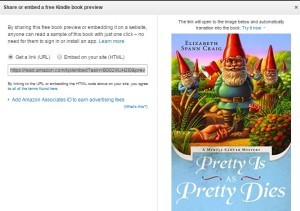
Do you read your newsletters from Amazon? I’ll admit that I haven’t for years…not until the final couple of newsletters arrived in my inbox. I’m not much of a newsletter person, usually. This may explain why it pains me to send out newsletters to my readers. I feel as if I’m bothering them, even though they signed up for the thing.
This last email from Amazon had an interesting note about Kindle Preview (not Kindle Previewer, which is how we all proof our mobi files before hitting publish). Kindle Preview is a bit of code that we can embed on our website to allow readers to see a preview of our book or purchase the book (from Amazon, naturally) without leaving our site.
We can also get a preview link if we’d rather share it in our email tagline, etc.
A nice feature offered is the ability to add our Amazon Affiliate ID to the embed so that w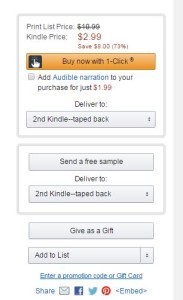 e get credit/commissions for/from the sale.
e get credit/commissions for/from the sale.
Readers can use any browser and can preview without having to log in to Amazon.
The process was very easy. I pulled up one of my books in my browser. On the right, under the “buy now/give as a gift/add to list” options and next to the share buttons, there is a hyperlinked “embed,” as you can see (in the sadly rather blurry image) on the right.
That opened a pop-up window. I chose the option to embed it, then clicked on “Amazon Associates ID.”
I typed in my Associates number (more about the Amazon Affiliate program here). It adjusted the embed code to include my ID.
Then I opened up my WordPress dashboard, clicked to each individual book’s page, changed the compose view to “text” instead of “visual,” and pasted the code.
We also have options to change the Kindle Preview image size, the placement of the buy button, and where we want the book content to appear.
It ends up looking like this:
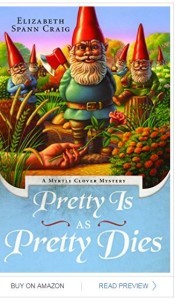
Have you tried Kindle Preview? Do you read your Amazon newsletters (I’m starting to! New resolution. :) )
The post Kindle Preview Embed appeared first on Elizabeth Spann Craig.
January 24, 2016
Writing Solo after Being Collaborative
By Elizabeth S. Craig, @elizabethscraig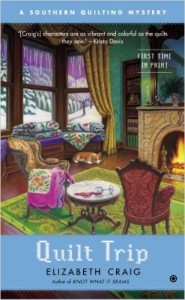
For the first time, I’m writing one of the Southern Quilting mysteries on my own. I got the rights to my characters back from Penguin Random House last year.
Although I was excited to keep writing the characters and their adventures, it’s been a bit unsettling. I wasn’t expecting to feel unsettled since this is the second series that I’ve gotten my rights back for.
But the first series had only one book traditionally published before I started self-publishing the rest. This series had a good five books in it.
What’s more, I had written the Southern Quilting series as a collaborative effort with my editor. We’d bounce around a few ideas, I’d send her an outline, she’d give her (always very thoughtful) opinion on it, and I’d usually make changes—small and large—before writing the manuscript.
The more I think about it, the more I recognize what a huge part she played in the series.
I’m far more used to being a lone wolf writer than a collaborative one. I’ve written something like fourteen books with minimal editorial input. With the exception of this one series.
Unfortunately, my editor was laid off from Penguin-Random House last summer, one of many victims of the merger.
The series, despite the fact that Penguin was pushing a digital-only contract on me last year, was successful. I get emails regularly from readers who enjoyed the books and are asking when the next one is coming out.
What I wonder is—what parts of the books were the readers resonating most with? Because my editor and I had very different areas that we focused on.
For instance, my editor was especially keen on adding lots of textual detail to the books. They are the Southern Quilting books. If I didn’t include enough quilting scenes, she’d ask me to include more. She promised me my readers would especially enjoy them.
I was always pretty restless with these requests. I’d honor them, but I also slipped in a hefty amount of plot or character development at the same time. Perhaps Beatrice was working on a batik fabric in an arrowhead variation block. But she was casting arrows at a potential suspect at the same time.
My editor also cared a lot about the settings and wanted more detail than I usually give. I did provide a lot more at her request. She also added a Yankee sensibility to my Southern books. She stopped me when there was something she didn’t understand or when she needed more information on a throwaway word that I thought everyone knew.
Clogging? What’s that? she asked.
A type of folk dance that’s popular in the mountain towns of the South, I wrote back with a mental shrug.
Can you describe it? she asked.
Describe clogging??
There were also recipes and quilting tips at the backs of the books, which my editor had expressly asked me to include.
As I’ve been working, solo, on this new book, I’ve been writing it as I usually would. Without all the extra detail. I’d always add the detail in later, in a separate layer of writing. I’m wondering, now, how faithful I’ll be to the way I wrote the previous books. Will I focus as much on the quilting subplots? Should I? Can I leave out the recipes and quilting tips or will I be dinged in the reviews for that—I do see readers mentioning them in customer reviews. Clearly I should be more careful with my Southernisms, too.
Has your relationship with an editor ever bordered on collaborative? Or have you co-written with another author?
Going solo with a series after collaborative writing with an editor:
Click To Tweet
The post Writing Solo after Being Collaborative appeared first on Elizabeth Spann Craig.
January 23, 2016
Twitterific Writing Links
by Elizabeth S. Craig, @elizabethscraig
Twitterific writing links are fed into the Writer’s Knowledge Base search engine (developed by writer and software engineer Mike Fleming) which has over 30,000 free articles on writing related topics. It’s the search engine for writers.
(developed by writer and software engineer Mike Fleming) which has over 30,000 free articles on writing related topics. It’s the search engine for writers.
Looking Into a Killer’s Eyes to Bring a Character to Life: http://ow.ly/WR4HI @emilyross816
Writing the Hard Stuff: http://ow.ly/WR4Mk @suddenlyjamie
4 Tactics to Create Your Novel’s Perfect Last Line: http://ow.ly/WR4A8 @sacha_black
Best Practices for Author Facebook Pages and Groups: http://ow.ly/WR4zj @JaneFriedman
Crowdsourcing your editor: http://ow.ly/WR4NT @kseniaanske
Why Story Beginnings and Endings Must Be Linked: http://ow.ly/WR4Bi @KMWeiland
Writing Characters with Mental Health Issues: http://ow.ly/WR4FZ @oliviavetrano
3 Myths of Fiction Research: http://ow.ly/WR4ri the Plot Line Hotline
Why the undead live on: http://ow.ly/WR4td @spikedonline by Tim Black
The Key to Publishing Success: http://ow.ly/WR4Do by Chelsea Apple @wherewriterswin
Sculpting a Memoir : http://ow.ly/WR5jy @sfsculptor @womenwriters
7 Tips for Writing a Plot Summary: http://ow.ly/WTj85 @josiskilpack
Writers renting shared work space: http://ow.ly/WTjuQ @SwansonWriting @thewritermag
Lesson from The Force Awakens: http://ow.ly/WTjMI @noveleditor
A Breakdown of the Good and the Bad of True Detective Season 2: http://ow.ly/WTiF9 @seanbhood
8 Tips to Writing Unreliable Narrators: http://ow.ly/WTjrF @debcaletti
Build Your Author Brand: http://ow.ly/WTk4l @damselwriter
Fiction Writing Checklist: http://ow.ly/WR5hZ @AJHumpage
Romantic relationships between police detectives in crime fiction: http://ow.ly/XpZ2d @mkinberg
How to Become a Freelance Writer While You’re in College: http://ow.ly/WPEoJ @kirstinkelley1
Watch out for quality control emails from Amazon: http://ow.ly/XpmWF
10 Ways To Beat Writer’s Block: http://ow.ly/WPEvu @NatePhilbrick
How 1 Writer Gave Up On the Great American Novel and Got a Book Deal: http://ow.ly/WPEqI @EdTarkington @thelithub
Breaking the Curse of Distant Perspective: http://ow.ly/WPEmR by Chris Winkle
Working on multiple projects at once: http://ow.ly/WPEz1 @KelsieEngen
Surviving Failure and Rejection: http://ow.ly/WPEti @barbaraoneal
How to Correct Parallelism in Writing: http://ow.ly/WPEkU @Grammarly
Tips for Developing Your Voice: http://ow.ly/WPEx8 @writingforward
3 Tools for More Productive and Organized Writing: http://ow.ly/WPEjT @jenn_mattern
A Step-by-Step Guide to Build Your Author Website: http://ow.ly/WPEI8 @JaneFriedman
Overcoming Fear of Twitter: http://ow.ly/WPECv @chrismjane
Honor Your Writing: Learning from Practicing Yoga: http://ow.ly/WPEEb by Sue Bradford Edwards
Rewriting Your Script: Scene-by-scene breakdown: http://ow.ly/WNpjv @gointothestory
5 Easy Tips for Dealing with Email: http://ow.ly/WNpyr @kayelleallen
Avoiding a ‘Mary Sue’: http://ow.ly/WNpIO by Plot Line Hotline
5 Google Search Tips for Authors: http://ow.ly/WNpDc @virginiagkelly
Writing Romance is a Different Animal: http://ow.ly/WNp8u @CarolAnneMalone
10 Character Clichés To Watch Out For: http://ow.ly/WNpdh @NatePhilbrick
When is a Book “Out of Print”? http://ow.ly/WNpgI @susanspann
10 Pre-Publication Tips: http://ow.ly/WNpvw @ceciliaedits
5 Ways to Squeeze Writing into Your Life: http://ow.ly/WNpmr @kirsticall
Screenwriting: Using a Prologue: http://ow.ly/WNpLQ @dougeboch
5 Things Writing Teaches About Life : http://ow.ly/WKfTh @womenwriters @meldecarlo
Anatomy of an Effective Book Trailer: http://ow.ly/WKgq7 by Claudia Cangilla McAdam
4 Major Mistakes to Avoid When Writing Blog Posts: http://ow.ly/XjhX1 @karencv
How important is SEO to novelists?The Hot Sheet: http://eepurl.com/bMNVw9 @Porter_Anderson @JaneFriedman
Free online conference Jan. 27 to mark on calendar: http://ow.ly/Xjie1 #LBF16 @Quantum16 @Porter_Anderson
A New App Turns a Romance Novel Fantasy Into Reality: http://ow.ly/XjdDa @claireefallon
When suspects tell half-truths in crime fiction: http://ow.ly/XjdwV @mkinberg
33 Ways to Write Stronger Characters: http://ow.ly/WKgbX @shesnovel
How to Use Either, Neither, Or, and Nor Correctly: http://ow.ly/WKfLt @epbure
A History of Punctuation for the Internet Age: http://ow.ly/WKgDM @AdrienneRaphel @NewYorker
Small Press/Big Press Pros and Cons: http://ow.ly/WKgfB @klingonguy
5 Lessons in First Person POV: http://ow.ly/WKgm1 @sacha_black
Multiple Characters: Who’s Most Important? http://ow.ly/WKg6i @artofstoriesAB
Writing Tense Scenes: http://ow.ly/WKgv4 @NatePhilbrick
Teaching Writing: When to Pop Out of the Notebook: http://ow.ly/WKgK7 @BethMooreSchool
The Best Way to Ensure Long-Term Success as a Writer: http://ow.ly/WKg2o @colleen_m_story
YA clichés: http://ow.ly/WKfI1 @Brianna_daSilva
Want to Be a Better Writer? Cut These 7 Words: http://ow.ly/WKg9E @joebunting
How to Guarantee that You Stick to Your Writing Schedule: http://ow.ly/WKfNP @ttamreyem
101 Book Marketing Ideas to Promote Your Book: http://ow.ly/Xhysc @SmithPublicity
5 Newbie Mistakes Writers Make When Asking for Feedback: http://ow.ly/WxkLn @Lexirad
Character perceptions in settings: http://ow.ly/WH2cz @BookOmnivore
Making Document Goals in Scrivener: http://ow.ly/WH1Nn @KelsieEngen
The Force Awakens Was Great Until It Wasn’t: http://ow.ly/WH1vg , http://ow.ly/WH1vv , http://ow.ly/WH1vM @cockeyedcaravan
3 Current Trends in Screenwriting: http://ow.ly/WH2jO @dougeboch
4 Ways to Use Subplots: http://ow.ly/WH2fT @dougeboch
6 Depressing Realities Of Writing YA Fiction: http://ow.ly/WH1mp @MenezesCracked
Stereotypical Perspectives: http://ow.ly/WH23n @KrisMcmorris
The Metamorphosis of Darth Vader: http://ow.ly/WH20r @gointothestory
Print to Digital: Cleaning Up Your Word File: http://ow.ly/WH29v @byondpapr
How to Write a Novel Worthy of Publishing: http://ow.ly/WH1Tu @MCristianoWrite
The transformation of libraries: http://ow.ly/Xdymy @Porter_Anderson
Should a Monster Ever Meet Its Metaphor? http://ow.ly/WFbgS @cockeyedcaravan
Crime novels in which sleuths fixate on one suspect: http://ow.ly/Xdxvl @mkinberg
Would you pay to turn the first page of this bestseller? http://ow.ly/WAGHU @RayRhamey
Tips for Dealing with Depression as a Writer: http://ow.ly/WxkKb @Lexirad
Adding Suspense to Romance: http://ow.ly/WFcf7 @jkcoi
Top 10 Winter Poems: http://ow.ly/WFbNw @lwlindquist @tspoetry
Writer Worksheet: Mind/Body: http://ow.ly/WFaOo @evadeverell
How to Put White Space Back in Your Life: http://ow.ly/WFbul @C_Herringshaw
5 Common Character Mistakes: http://ow.ly/WFbmd by Chris Winkle @mythcreants
Rewriting Your Script: Characters: http://ow.ly/WFazR @gointothestory
Using Action Points to Tell a Good Story: http://ow.ly/WFbWI @shalvatzis
Static Vs. Dynamic Scene Settings: http://ow.ly/WFb54 @RichardWalterUC
10 Goals for Your Blog: http://ow.ly/WFc6u @WriteOnOnline
The links I shared last week: http://ow.ly/Xca2Z . All the links I’ve ever shared (30K+, free and searchable): writerskb.com
5 Productivity Hacks Anyone Can Use to Write Books Faster: http://ow.ly/WxkIS @Lexirad
What Opera Teaches About Writing: http://ow.ly/WAGtB @WriteToSell
The importance of details: http://ow.ly/WAGZK @caroclarke
Color Code Your Senses: http://ow.ly/WAHgm @SuddenlyJamie
4 Most Common International Ebook Discounting Errors: http://ow.ly/WAGKV @dianaurban
Cognitive Dissonance and Writing: http://ow.ly/WAHbm @DianeMacKinnon
How to Write a Killer Scene: http://ow.ly/WAGz2 @patverducci
The top writing links from last week on Twitterific:
Click To Tweet
The post Twitterific Writing Links appeared first on Elizabeth Spann Craig.
January 21, 2016
Amazon Pushing Quality Control
by Elizabeth S. Craig, @elizabethscraig
Amazon is sending out emails warning authors that they need to upload corrections to their books or else receive a quality-related warning label on their book page starting February 3rd:
Starting February 3, 2016 we will begin showing customers a warning message on the Amazon.com Kindle store detail pages of books that contain several validated quality issues. We will remove this message for a book as soon as we receive the fixed file from you and verify the corrections – typically within 2 business days.
We understand that even with the best quality controls, defects sometimes make it through. That’s why we’ve limited this messaging to books with several issues. Books with more serious quality issues will continue to be suppressed from sale.
…
Before the warning message appears, we would like to work with you to ensure these issues are fixed. After you’ve made the corrections, please upload your revised content through the ‘Book Content’ section in your KDP Bookshelf and republish it by clicking “Save and Publish” so that we can verify the corrections and prevent the warning message from being displayed on your book’s detail page.
Sadly, I received one of these emails. As you can imagine, it made me jump into action.
The book was one of the first self-published books that I published. In 2011, I paid a pretty penny for a formatted file with an absolutely gorgeous interior design.
Unfortunately, pretty penny or not, the formatting makes text either difficult or impossible to read on certain Kindle devices (many of which launched after the formatting was created in 2011), according to Amazon. This includes my title page, dedication, chapter headings, and the first letter of each chapter.
I have a new formatter now and I sent it to him yesterday. Rik Hall was good enough to immediately take care of the issue. I’ve already uploaded a corrected file to Amazon.
There were also two inexplicable items Amazon listed. They referred to two typos:
Issue: Typo. Details: "down" should be "down" ". Location: 1144.
Issue: Typo. Details: "moment" " should be "moment". Location: 2453.
But neither location included either of those words, either in dialogue or in the narrative. What exactly was the issue that they needed corrected?
The email, if you get one, does refer to an address to write for more help. I did send an email (regarding the ‘moment’ and ‘down’ mentions) and heard back nearly immediately that they’d forwarded my email to their ‘quality team’ for follow-up and that I should hear back in a couple of days.
Despite the drop-everything-and-work-on-this-one-issue feeling that I got from the email, I’m glad that Amazon is implementing some quality control measures. I definitely want my book to be easy to read and as error-free as I can make it. That only helps me in the long run.
I do wish I’d heard of any formatting problems before now. Maybe an email was in my spam folder for a while? Usually readers are quick to either email me regarding issues or write about problems on a review. Hard to imagine this just popped up when the book has been out for 5 years.
But this post is just to say…watch your inbox for an email like this one. None of us want warning labels on our book pages! Ugh.
Keep an eye out for quality control emails from Amazon:
Click To Tweet
The post Amazon Pushing Quality Control appeared first on Elizabeth Spann Craig.
January 17, 2016
What I’ve Learned in 20 Books’ Time
by Elizabeth S. Craig, @elizabethscraig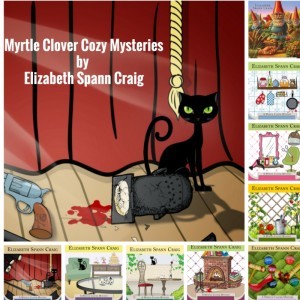
I realized a couple of weeks ago that I’m working on my 20th book.
A lot has changed since book one. I shopped the first couple of books to agents and traditional publishers since self-publishing wasn’t the great option it is now. Digital publishing and digital reading hadn’t yet exploded on the scene.
Here’s some of what I’ve learned:
Process:
Outlining helps me write faster.
However, writing from an outline doesn’t give me as much job satisfaction as when I make it up as I go along.
Readers sometimes enjoy my subplots better than the main plot. Lesson: don’t neglect the subplot.
Self-edit to make my manuscript as error free as I can. Printing it out, converting it to a format I can read on my Kindle, or reading aloud is a good way to get distance from it. This saves me money on my self-published editing.
Editors still read my carefully self-edited manuscripts and find errors big and small.
When writing a mystery, it’s important to keep track of all the loose ends and make sure they’re carefully tied up at the end. Lists help.
Pomodoro is a great technique to help me write. Particularly if paired with an energetic activity during the break time. Housework, for example. I’m always happy to stop with the housework and pick up with the story again.
Experienced editors can have excellent developmental suggestions. One of mine saved the life of a minor character who ended up being one of the biggest draws of the series.
When writing, it’s helpful to have a document with character traits nearby.
The more books that I have in a series, the more meticulous I must be in noting detail in a series bible.
If I get in a rut, I need to immediately analyze what’s going on. What’s the problem with the story? Why am I reluctant to write it?
Don’t write on a laptop while sitting on a sofa with my feet on the coffee table. Don’t do it. I must commit to memory the $500 I paid for physical therapy. Kitchen counter writing is much better for me.
Sometimes the best thing I can do to make faster progress on a story is to change things up: write in longhand, dictate my story, write at the library or at the coffeehouse, or try writing at a different time of day.
I have to be flexible. I have to be able to grab 5 minutes here and there. I have to be able to write anywhere (EXCEPT on the sofa. See above).
My reader reviews on Amazon provide me with feedback that helps me tweak my stories for better commercial success.
Promo and Business:
Free promos work faster and better than anything else I’ve tried. The cost is merely the cost of lost revenue. I use Smashwords or Draft2Digital to get Amazon to price match.
Newsletters are excellent sales tools. I wish I’d started earlier with them.
Finding a social media platforms that I can tolerate and keep up with is important.
Publishing, marketing, and writing advice isn’t one size fits all. It’s good to know the advice, but it doesn’t mean I don’t have to test it. The standard advice for social media is to interact and to avoid scheduling posts. I decided not to take that advice for my Twitter account and it’s worked out well for me.
Brand under my real name. Don’t invest too much time in a pen name.
Go wide. Make my work available on as many platforms as possible, as soon as possible.
Keep a separate bank account for writing-related earnings and expenses.
Keep a database of cover designers, formatters, etc, just in case someone on my team needs to take a break from work for any reason.
Get on the calendar of my designers, formatters, and editors months in advance.
Keep up with industry news to learn of new opportunities and ways to experiment.
It’s good to learn how to do everything I outsource. Just in case.
It’s good to learn how to outsource. Being a control freak isn’t healthy.
What advice do you have to share? What kinds of things have you learned?
What 1 writer has learned while writing 20 books:
Click To Tweet
The post What I’ve Learned in 20 Books’ Time appeared first on Elizabeth Spann Craig.
January 16, 2016
Twitterific Writing Links
by Elizabeth S. Craig, @elizabethscraig
Twitterific writing links are fed into the Writer’s Knowledge Base search engine (developed by writer and software engineer Mike Fleming) which has over 30,000 free articles on writing related topics. It’s the search engine for writers.
(developed by writer and software engineer Mike Fleming) which has over 30,000 free articles on writing related topics. It’s the search engine for writers.
A writer changes her mind on free books and using IngramSpark: http://ow.ly/X60U6 @Roz_Morris
How to Find a Literary Agent for Your Book: http://ow.ly/Wxnoj @JaneFriedman
4 Tips for Succeeding at a Conference: http://ow.ly/WxnqK @ChristianBerkey
#FutureChat: Authors on the march in 2016: http://ow.ly/X6lvc @Porter_Anderson
4 Resources to Check Out for Building a Better Novel: http://ow.ly/Wxnvp @reallucyflint
How to murder a character? Methods from Inspector Morse: http://ow.ly/XaoNY @Jag248RPA
Here’s Why You Need a Writing Graveyard: http://ow.ly/Wxnz4 @reallucyflint
AmazonCrossing, BookTrack, SELF-e Updates: http://ow.ly/X6m1q
You’ve Finished a Rough Draft. What Now? http://ow.ly/WyMm1 @EmilyWenstrom
Defining women’s fiction: http://ow.ly/WyMow @AmySueNathan
How Horror Saved 1 Writer’s Life (And Why Writing it is Good for the Soul): http://ow.ly/WyMuW by Alexander Gordon Smith @tordotcom
5 Writing Tips For Teens Seeking To Become Authors: http://ow.ly/WyMjY @writeonepub
What to do About Twitter Non-Followers: http://ow.ly/WyMmM @EmilyWenstrom @DIYMFA
Scrivener: Creating a New Doc and Working with Scenes: http://ow.ly/WyMqE @KelsieEngen
Accidental Outdated Slang in YA: http://ow.ly/WyMtz @HeatherJacksonW
How To Import Word Comments into Scrivener in 5 Easy Steps (PC Version): http://ow.ly/WxkGC @Lexirad
Co-authoring and Writing for Anthologies? Read this first: http://ow.ly/WzpTL @ELWicker
The Redemptive Arc: http://ow.ly/WzpI7 @DavidCorbett_CA
Checklist: How to Write a Query Letter That Doesn’t Suck: http://ow.ly/Wzpmx @mridukhullar
How mindfulness helped writer @Rubywax through depression: http://ow.ly/WzoRH
13 Ways to Stay Creative: http://ow.ly/WzpVF @kylieday0
Writing Tips for Getting and Staying Organized: http://ow.ly/WzpJx @writingforward
The importance of paying attention as a writer: http://ow.ly/WzpMF by Annette Lyon
What Should I Study In College If I Want To Be A Writer?” http://ow.ly/WzpbB @stephmorrill”
The 4 Rs Of Speech Writing: http://ow.ly/WzpOl @AnthonyEhlers
5 Uses of Real Science in The Expanse: http://ow.ly/Wzpoz by Oren Ashkenazi
Rewriting Your Script: Set It Aside: http://ow.ly/WzpRr @gointothestory
5 Productivity Hacks Anyone Can Use to Write Books Faster: http://ow.ly/WxkIS @Lexirad
How the Internet changed the way we read: http://ow.ly/Wzp25 @dailydot @jacksonbliss
How To Resuscitate A Lifeless Scene: http://ow.ly/WAGEI @writers_write
A Story Game to Train Our Imagination: http://ow.ly/WAH4d @hodgeswriter
Beginners’ 4 faults: http://ow.ly/WAGTR @caroclarke
How to Write What You Know And Then Change the Story: http://ow.ly/WAGQ1 @Sejal_Badani
The Minimalist Guide to Writing Brilliant Settings: http://ow.ly/WxkEr @Lexirad
10 Writer’ Resolutions We Can Keep: http://ow.ly/WxmhF @CatMousePress
Do writers need ‘public solitude?’ Writing, offline and on: http://ow.ly/X3ciD @Porter_Anderson
The Making of an Indie Audiobook: A How-To Guide: http://ow.ly/WxjIb @Lexirad
Be Realistic About Your Writing Resolutions: 5 Tips: http://ow.ly/WxmGN @writers_write
6 Self-Editing Tips: http://ow.ly/Wxm2n @ProWritingAid
How to launch your book with at least 25+ Amazon reviews: http://ow.ly/WxmSU @timgrahl
50 Plot Twist Ideas for Your Work-In-Progress: http://ow.ly/Wxn2y @reallucyflint
Making the Most Out of Your Marketing Buck: http://ow.ly/Wxm96 @jaimiengle
The Self-Publishing Checklist: Editorial, Production, Distribution: http://ow.ly/WxmYA @JaneFriedman
What’s your wheelhouse? A quiz for creatives: http://ow.ly/Wxmnh @ramonadef
How To Filter Description Through Your Characters: http://ow.ly/WxmKf @margmcalister
Trust Your Nouns and Verbs: http://ow.ly/WxmdQ @kcraftwriter
Developing Sleuth, Villain, and Victim Characters: 40 Character Questions: http://ow.ly/WxmBI by John Morgan Wilson
Write Your Character’s Eulogy: http://ow.ly/WxkiO @KerryGans
Why 1 author will stop writing her bestselling series: http://ow.ly/X0Y9n @JulieHyzy
What’s the Best Way to Label Your Chapters? http://ow.ly/Wxkkj @Janice_Hardy
Before You Launch a Patreon for Your Writing, Read This: http://ow.ly/Wxk7y @hellothefuture
How to Know Your Book’s Cover Needs a Redesign: http://ow.ly/Wxk8L @dianaurban
Launch Etiquette: MUST You Buy the Book? http://ow.ly/WxkgA @KerryGans
Writing Conflict: How to Ruin (Fictional) Lives: http://ow.ly/Wxkat @jodimeadows
How to Increase Sales at Apple iBooks: http://ow.ly/Wxk50 @goblinwriter
How To Write A Non-Fiction Book: http://ow.ly/WxjRN @thecreativepenn
Working with Public Libraries: A Guide for Authors: http://ow.ly/WxjGR @kathys_quill
How to Build a Book-Based Email List: http://ow.ly/WxkcH from Authority Self-Publishing Podcast
The Ebook Retail Universe: http://ow.ly/Wxkm8 @dkudler
Writing and Publishing with a Book Packager: http://ow.ly/Wxjux @TalkativeTara @Paperlanternlit
The Night-Sea Journey and How to Use it in Your Story: http://ow.ly/Ww26F @evadeverell
. @Wattpad: why it’s important and how writers can best implement it: http://ow.ly/WWuLr @Star2dotcom @liztai
How to Use Scrivener to Start and Finish a Rough Draft: http://ow.ly/Ww280 @mgherron
“Birdman” Triumphant: A Genre Assessment of an Unconventional Narrative: http://ow.ly/Ww25Z @SeanPCarlin
Sifting Through Story Ideas: http://ow.ly/Ww2dG @jodimeadows
Inciting Incidents: A Breakdown: http://ow.ly/Ww23y @sjaejones
How to Write a Book Series: http://ow.ly/Ww2gt @shesnovel
The Hobbit: An Unexpected Journey: 7 Point Story Structure: http://ow.ly/Ww2hP @kylieday0
How Many Obstacles are on the Hero’s Journey? http://ow.ly/Ww2f3 @BetterNovelProj
Character Lists: Coax Your Characters out of Hiding: http://ow.ly/Ww2c8 @writeabook
Paid Ads for Books (How to Test Them in 2016): http://ow.ly/Ww29H from Authority Self Publishing
A Dissection of Han and Leia: http://ow.ly/Ww28W @writingeekery
5 Hard-Hitting Plot Tools To Unstick Your Story: http://ow.ly/Ww24L @MandyCorine
Creating Compelling Characters: http://ow.ly/Wp4sZ @hywood
Egocentric characters in crime fiction: http://ow.ly/WTmF1 @mkinberg
3 Twists to Move Past Stereotypes and Freshen Your Characters: http://ow.ly/Wsaqu @Julie_Glover
Submitting to Anthologies: What You Should Know and Why You Should Give It a Try: http://ow.ly/WTlDA @LGKeltner
Using IngramSpark to print and distribute our books: http://ow.ly/WT0l6
Writing the Small Town Romance: http://ow.ly/Wp4m5 @ktlane3
Book Sales Tips from a Book Fair Director: http://ow.ly/Ws9mf @FrugalBookPromo
Turning a Cover Change Into a Positive Marketing Experience: http://ow.ly/Ws9uy @FrugalBookPromo
How The Literary Class System Is Impoverishing Literature: http://ow.ly/WsakJ @thelithub @BerryFLW
How They Write A Script: Terry Southern: http://ow.ly/Ws9Sv @gointothestory
11 Things Learned by not Working in Pajamas: http://ow.ly/Ws9P5 @ErinMFeldman
6 ways for writers to stay safe online: http://ow.ly/Ws9zi by Alex J Coyne
50 Things a Writer Shouldn’t Do: http://ow.ly/Wsa5w @@ThreeGuys1Book
5 Ways to Improve Our Twitter Profile: http://ow.ly/Ws9Zj @denisewakeman
Subtext: A Key Element of Dialogue: http://ow.ly/Ws9M1 @writeabook
6 Quick Tips for Author Marketing: http://ow.ly/Wp4jY @kayelleallen
25 things to keep in mind when writing a book: http://ow.ly/Wq55J @AuthorAthenaM
Don’t want to kill a character? At least throw rocks: http://ow.ly/WS9VF @DRRanshaw
The 3 Essential Elements to Creating a Believable Romance: http://ow.ly/Wp4hO @CSLakin
Writer Worksheet Wednesday: Stories I Need to Tell”: http://ow.ly/Wq5WD @evadeverell”
Writer Worksheet Wednesday: Writer’s Statement: http://ow.ly/Wq63H @evadeverell
Why Liking or Commenting on a Blog is so Important: http://ow.ly/Wq5MI @KelsieEngen
3 Myths of Fiction Research: http://ow.ly/Wq69L from Plotline Hotline
The post Twitterific Writing Links appeared first on Elizabeth Spann Craig.
January 14, 2016
AmazonCrossing, BookTrack, SELF-e Updates
By Elizabeth S. Craig, @elizabethscraig
I’ve been experimenting with or pursuing different avenues for distribution and visibility. Here are updates on what I’ve been working on with links in case you want to check these things out, yourself.
AmazonCrossing—Amazon is now publishing translated fiction for international readers. You send them a pitch and they consider your work for translation by their publishing arm. As I suspected, it’s tough to get in—I got a rejection email last week. But the email also invited authors to keep sending them other work to pitch, so I may give another book a go. Who knows? Maybe they’d be happier with my zombie book. If you’re interested in checking it out, the link is here: https://translation.amazon.com/submissions
BookTrack—Speaking of the zombie book, I received an email from BookTrack…this is the company that matches soundtracks with books (the soundtracks adjust to the reader’s pace). I’d been interested in the opportunity when I first read about it on Hugh Howey’s blog. But I knew I had absolutely no time to take on a project like that (although I’m interested in reaching out to a variety of different readers on a variety of different formats). Also, I wasn’t sure that my genre would be a match for the format.
Apparently the zombie book is, though. They offered to produce the booktrack and put my book up on the platform. That sounded like a good plan to me since I still have no time at all.
It sounds like they’re actively seeking out content. Does this mean this format is really catching on with younger readers?
Wattpad—I’m still fascinated at the international reach on this platform. My demographics on Wattpad for my A Body in the Backyard (a very gentle mystery taking place in a small town in the Southern US) show readers in Pakistan, the Philippines (20%!), India (13%), Kenya, Tanzania, Nigeria, Brazil, Russia, Norway, and Australia. It’s nice to feel I’m doing something to develop an international audience. And it’s free for me to do so.
Virtual Assistant: I ran into a frustrating issue while trying to upload a spreadsheet of new subscribers to MailChimp. As I delved deeper and deeper into researching the issue I finally stopped and thought: “I’m already spending way too much time on this.” So, yep. I asked my author assistant to help me out with it. And, while he was at it, to try and make my template for my newsletter look better than it currently does. I’ve never been happy with the newsletter template I created, which looks uneven to me. I’m great with design when I can use Canva. When I can’t use Canva, my design skills are non-existent. Even with text design. If you’re interested in doing this kind of outsourcing of frustrating tasks yourself, there are free listings of author assistants here and here.
Library SELF-e. Last year I started submitting digital mysteries to the SELF-e platform: a partnership between Library Journal and the US public library system. More about Self-e in this article that journalist and SELF-e consultant Porter Anderson wrote for my blog: “SELF-e Gets Indie Books Into Library Catalogs.” For me, almost everything that I do is for exposure/discoverability. That includes free ebooks, Wattpad (full-length novel uploads, leaving the books up for free), and Library SELF-e. Although authors don’t receive payment, I do feel it’s a good way to gain visibility for my series. And, if we have a perma-free book anyway, why not use that book to reach new readers. One of my books was one of the top-three most-read mysteries in the SELF-e program for 2015, so I know I’m getting reads. To submit your own book for consideration, go here. For an overview of different kinds of ebook library services (pros and cons of each one), read this article from the ALLi blog by Andrew Lowe: “Ebook Library Services For Authors: An Alliance of Independent Authors Report.”
That’s all I’ve got in the way of updates right now. What kinds of things are you working on? How are they going?
Updates on experiments with AmazonCrossing, BookTrack, SELF-e, and more:
Click To Tweet
The post AmazonCrossing, BookTrack, SELF-e Updates appeared first on Elizabeth Spann Craig.
January 10, 2016
IngramSpark
By Elizabeth S. Craig, @elizabethscraig
I’d been hearing a lot about IngramSpark, but I hadn’t ever figured out why I might need them as a print book manufacturer/distributor. My books were on CreateSpace and selling well through Amazon. It seemed as if my relationship with Amazon was filling the print book need.
At the NINC conference in October, it finally fell into place: bookstore distribution.
I tend to pooh-pooh bookstore distribution. My pooh-poohing is premature. I do, according to my Penguin-Random House royalty statements, still sell a lot of print books. The statements are, however, less than transparent, but I’m still going to assume that those print sales are at non-Amazon retailers. I tend to have a dim outlook on the future of large, Barnes&Noble-esque booksellers, but the truth is that print isn’t going anywhere anytime soon and B&N isn’t the only game in (many) towns.
The point is that some retailers might rather not stock books that they have and order through a competitor. Amazon. Additionally, Ingram makes international order fulfilment possible. They not only ship internationally, they print internationally. This ensures that shipping costs are kept to a minimum and that readers receive our titles quickly.
Also interesting is that IngramSpark purchased Aer.io. This acquisition may mean some cool opportunities to sell on our won sites and allow Ingram to do order fulfillment. You can embed a store on your site. Journalist Porter Anderson wrote an article, “Ron Martinez on Aer.io’s acquisition by Ingram: ‘We’re very lucky’” for The Bookseller that gives an overview of what this acquisition might mean for authors.
My first question was—can I be on both IngramSpark and CreateSpace? Yes, we can. This means that we’ll likely want to discontinue expanded distribution with CreateSpace (which we have to pay for) and that we’ll want to make sure that we use the same ISBN for both the CreateSpace print version and the IngramSpark print version (or else Amazon will “see” the title as a separate book).
This also means that we need to have an ISBN, obviously, of our own for the print format. Not the free CreateSpace one. IngramSpark does require authors to have ISBNs. I know this may be a sticking point for many writers. I’ve always just bought my own ISBNs, in bulk, directly from Bowker. I want my name as the publisher on record, not CreateSpace or Smashwords, etc. Bowker does run sales…I like to buy the ISBNs on sale. I wish they’d make the things much, much cheaper, but there it is. I write the expense off on my taxes.
Besides ISBN costs (if you don’t already have them), there are separate costs to working with IngramSpark. For instance, there’s a set-up fee. It’s $49. Here’s a link to the costs of working with them.
The process of uploading my files and creating an account was simple. It was very similar to the CreateSpace process, if you’re familiar with it.
I did find that one of my covers for CreateSpace did not pass through the IngramSpark review process. The bleed was off. I will need to get with my cover designer to make an adjustment. This cost is expected to be minimal.
If you’re going into the process with a brand-new interior/exterior file, you should be in good shape because you’ll use their specs. If you’re wanting to publish to both CreateSpace and IngramSpark, the general advice seems to be to choose a trim size that’s compatible on both platforms, right from the start. There are other considerations for production, too. Jen Lang has a very helpful post, “Book Production: More Tips on Using CreateSpace and IngramSpark Together” on ALLi’s blog.
You can also find more information on using CreateSpace and IngramSpark together in “How to Use CreateSpace and IngramSpark Together” by Karen Myers, also on the ALLi blog.
Hope this helps to make the two services and what they offer a bit less confusing. I know that I put off making a decision on IngramSpark because I didn’t understand what they could offer me. Have you taken a look at IngramSpark? If you’re using it, are you pleased?
Using IngramSpark to print and distribute our books:
Click To Tweet
The post IngramSpark appeared first on Elizabeth Spann Craig.
January 9, 2016
Twitterific Writing Links
by Elizabeth S. Craig, @elizabethscraig
Twitterific writing links are fed into the Writer’s Knowledge Base search engine (developed by writer and software engineer Mike Fleming) which has over 30,000 free articles on writing related topics. It’s the search engine for writers.
(developed by writer and software engineer Mike Fleming) which has over 30,000 free articles on writing related topics. It’s the search engine for writers.
Why Writers (Sometimes) Make the Worst Critics: http://ow.ly/Wm8zF by Josh Rutherford
The Lazy Author’s Way to Identify and Overcome Writing Weaknesses: http://ow.ly/Wm8Qk @KMWeiland
How Scooby Doo Defined The Modern Slasher Flix Part 1: http://ow.ly/Wm9ik and 2: http://ow.ly/Wm9nn
Critique Groups Dos and Don’ts: http://ow.ly/Wm8Hb by Linda Wilson
5 Terrible Defenses of the Star Wars Prequels: http://ow.ly/Wm8KM by Oren Ashkenazi
Copyright Myths Authors Should Know About: http://ow.ly/Wm8OS @nlitherl
Elements of Screenwriting and Human Behavior: http://ow.ly/Wo5EI @WriterAtTheSea
Why is Lovecraft still relevant? http://ow.ly/Wo6kQ by Dejan Ognjanovic
Should You Start a Blog to Promote Your Writing? http://ow.ly/Wo5U2 @egabbert
How many queries should we send? http://ow.ly/Wo6aK by S. L. Saboviec
Genre Studies: The Literary Short Story: http://ow.ly/Wo5Ne @artofstoriesAB
The Ultimate Story Checklist: The Babadook: http://ow.ly/Wo5uE @cockeyedcaravan
The Psychology of Horror: Dissecting Fear: http://ow.ly/Wo6tz @edefuentes
Resolutions: Read to Fuel Your Writing: http://ow.ly/Wo6GL by Sue Bradford Edwards
Deconstruction for Writers: http://ow.ly/Wo6D7 @evadeverell
Micro Conflicts: Moving Scenes Forward: http://ow.ly/Wo6zz @artofstoriesAB
To Become a Writer, Just Do These 2 Things: http://ow.ly/Wo5zy @joebunting
Surviving Deadline: http://ow.ly/Wp2TO @_JennyMoyer
Introverts: 5 Things to Suggest at Your Next Conference: http://ow.ly/Wp31v by John Spencer
5 Rules For Creating Disabled Characters: http://ow.ly/Wp2OR @twuc
How to Find Your Best Standing Desk: http://ow.ly/Wp33b @colleen_m_story
Getting Clear on your Deepest Creative Truths: http://ow.ly/Wp2Qy @CreativeKatrina
Nonfic: 10 Ways to Move Through Fear of Starting to Write Your Book: http://ow.ly/Wp2L0 @NinaAmir
Self-Pubbing Print Books: Setting a Publishing Timeline: http://ow.ly/Wp2SV @ceciliaedits
#RealYA How Does It Affect Fiction? http://ow.ly/Wp2Jz @AuthorSAT
Some Practical Writing Advice From @DougCoupland: http://ow.ly/Wp34T
Pros And Cons Of Writing In 3rd Person: http://ow.ly/Wp2GX @MiaJouBotha
5 Tips for Writing a Sequel: http://ow.ly/Wp2NO @ShonnaSlayton
The Pragmatist: What Works: http://ow.ly/Wp2Vv @HannahRBarnaby
The 3 Essential Elements to Creating a Believable Romance: http://ow.ly/Wp4hO @CSLakin
5 Surprisingly Simple Ways To Subvert Stereotypes In Stories: http://ow.ly/Wq66C @AnthonyEhlers
Resources for writing and finishing a novel: http://ow.ly/Wq59N @TimHallinan
When an Agent Asks for a Revision, Take Your Time: http://ow.ly/Wq504 @agentsaba
How to Conduct Credible Research: http://ow.ly/Wq4RI @writingforward
Organize your writing with spreadsheets + free template: http://ow.ly/Wq4V1 @VeronicaSicoe
5 Things ’77 Star Wars Teaches About Storytelling: http://ow.ly/WlR42 @RogerDColby
How to Make Character Boards on Pinterest: http://ow.ly/Wm8D3 @YAtopia_blog
Story Climax: Forcing Characters to Move Forward: http://ow.ly/Wm8SC @jamigold
How Details Intrude in Writing: http://ow.ly/Wm8FG @KelsieEngen
What Type of Creative Thinker Are You? http://ow.ly/Wm9f3 @FinishedPages
2016: Crunch time for publishing, its writers and their readers: http://ow.ly/WI6lU @Porter_Anderson @mariraz
Strengthening Our Observation Skills: http://ow.ly/WlQIz @LaurelGarver
4 Lessons Learned From Writing a Serial: http://ow.ly/WlQQ9 @mariellahunt
Screenwriting: Flashbacks and Monologues: http://ow.ly/WlQXK @JamesNapoli
World Building Tip: Holidays and Rituals: http://ow.ly/WlQML @ava_jae
5 Ways to Start Working on a Sequel: http://ow.ly/WlR0w @RogerDColby
A Novel Performance: 30 Days In Seattle’s Central Library: http://ow.ly/WlR5j by Gabriela Denise Frank
How to Narrate a Riveting Fight Scene: http://ow.ly/WlR92 by Chris Winkle for @Mythcreants
Fantasy Worldbuilding: How-To: http://ow.ly/WlQHR @EmilyFRussell
Characters and Their Sensory Limitations: POV and Description: http://ow.ly/WlQLL @CSLakin
Facts and Narrative in History: http://ow.ly/WlQSY @artofstoriesAB
Writing for Love or Money: http://ow.ly/WlQP5 @BrunoniaBarry
Wrangling a Complicated Timeline: http://ow.ly/WlQU0 @KelsieEngen
7 Ways To Create Memorable Minor Characters: http://ow.ly/WGjnp @NatePhilbrick
The Complete Guide to Query Letters: Nonfiction Books: http://ow.ly/WGiB0 @JaneFriedman
Writer Beware: Author Solutions Sold to Private Equity Firm: http://ow.ly/WGioW @victoriastrauss
What Today’s Writers Are Thankful They’ve Missed Out On: http://ow.ly/Wir8s @MaryVeeWriter
7 Lessons from 1 Writer’s 1st Year as a Published Author: http://ow.ly/WirkF @MelindaFriesen
21 Tips to Help You Turn Your Non-Fiction Book Into a Business: http://ow.ly/Wirda @NinaAmir
Foreshadowing: Tips to Create Mood & Tone: http://ow.ly/Wirbn @robinrwrites
5 Books with Fictitious Works of Art: http://ow.ly/Wir1d @annecharnock
The Pros And Cons Of Writing In 2nd Person: http://ow.ly/WiqUu @MiaJouBotha
Do you wake up smiling? Feeling no pain? http://ow.ly/WirfK @MarleneAHibbard
Beginnings Are Hard, Even For Bestselling Authors: http://ow.ly/Wir4Y @GillespieKarin
6 Ways Standup Can Make You a Better Writer: http://ow.ly/WiqQ3 @WTurmel
Say No to Say Yes: http://ow.ly/Wir7x @barbaraoneal
18 Signs You Were Destined to be a Writer: http://ow.ly/Wirj4 @MarianSchembari
How Long Should Your Novel Be? http://ow.ly/WiqYj by Victor Salina
Liven Up Your Novel’s Opening: http://ow.ly/Wg8hs @lindasclare
Reducing Stress as a Writer: http://ow.ly/WAsED
How to Level Up Your Writing Habit: http://ow.ly/Wg8e7 @EmilyWenstrom
A Word about Quitting: http://ow.ly/Wg8ry @wendypmiller
Top 7 reasons why SPECTRE is average while SKYFALL soared: http://ow.ly/Wg8jH @speechwriterguy
How to Believe You Can Fly: http://ow.ly/Wg8p8 @colleen_m_story
6 Ways to Stay Creative as a Writer (When You’re a Parent): http://ow.ly/Wg8Rc by Lisa Lepki @writersdigest
5 Ways to Deal With Self-Doubt as a Writer: http://ow.ly/Wg8MW @BenSchmitt5
Creative Confusion and Finding your New Center: http://ow.ly/Wg8nl @CreativeKatrina
Line Editing: What to Look For: http://ow.ly/Wg8Un @ava_jae
Finding the Right Medium for Your Story: http://ow.ly/Wg8yF @AndrewDChapman @DIYMFA
Picture Books: Not So Easy: http://ow.ly/Wg8tX @AmyBearce @DIYMFA
How to Know Your Characters More Intimately: http://ow.ly/Wg8HG @BenSchmitt5
10 practices publishers can use to tamp down Amazon’s impact: http://ow.ly/We2gK by Stephen Blake Mettee
On the Frustration of the Friend of a Friend: http://ow.ly/We1eI @HeatherAlexand
How To Spot, Fix and Eliminate Passive Voice: http://ow.ly/We0R0 @menwithpens
6 months as FT Author: Burn Out: http://ow.ly/We1v6 @adamdreece
7 ways to get True Grit for Writers: http://ow.ly/We28P @kristenlambtx
9 Productivity Hacks to Help You Meet Your Deadline: http://ow.ly/We21S @emily_tjaden
Gamblers and Artists: http://ow.ly/We0Z1 @kristinerusch
The top writing links from last week on Twitterific:
Click To Tweet
The post Twitterific Writing Links appeared first on Elizabeth Spann Craig.
January 7, 2016
Timing a Release
by Elizabeth S. Craig, @elizabethscraig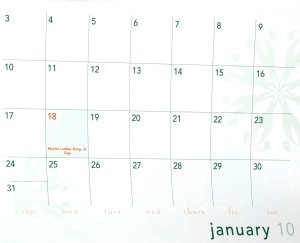
When I was strictly traditionally published, timing a release had nothing to do with me. It was, actually, in my contract. Usually I had a two or three book contract and my deadlines and the books’ release dates were spelled out.
The release dates even trickled into my writing…I frequently set the story during the season the book would be launching in.
I remember that other trad-published mystery writers weren’t happy about December releases, for example. I did have a trad-pub December release in 2013. It was a slow start for that book, but it has ended up being one of my long-term strongest-selling titles. Although slow starts do tend to make publishers nervous since they’re not so into publishing’s “long tail” as self-publishers are. They encounter returns from bookstores.
Toward the end of November, I had a completed Myrtle Clover (self-pub) book. I remembered the bias against holiday-timed releases. But there was no way I was going to sit on the launch, either. I’d listed the book as releasing in 2015. So I put it out on Thanksgiving weekend. I sent out a reader newsletter to announce the release, carefully set up the book’s pages on Amazon, etc., to reflect reader reviews for the rest of the series, and then just carried on with hosting house guests and doing family activities and stuff like that.
It was definitely a stronger start than the previous holiday timed release, but I credit my newsletter for that. I noticed that readers were buying the book, but they weren’t reading it or reviewing it like they had for the other books. That’s because it was smack dab in the middle of a holiday and no one had time to read. But they did want it.
I’ve also had a couple of August releases. Actually, I’ve probably had four or five August releases, both trad-pub and self-pub. August tends to be a slow month for me but the newsletter helped move books for the most recent August launches.
Of course, it doesn’t matter now nearly as much as it use to whether our book gets off to a fast start. It used to mean that bookstores would send our books back as returns to the publisher, where the books would be shredded or incinerated. It also meant that we might not get a contract extension. Digital bookshelves at retailers take up no space.
To catch up with where we’d like to be, sales-wise, we can consider running sales and doing giveaways on Goodreads. Or we could get traction before the release by pulling together a street team or getting editorial reviews prior to the release. Or we could simply count up all the 4 and 5 star reviews for the other books in the series and put a “readers love _____ (our character)! 400 4 and 5 star reviews for the series” on our book’s product page on the retail sites.
Are there months or seasons you avoid releasing a book in? How do you combat a slow sales month?
Thoughts on timing a book's release:
Click To Tweet
Image: MorgueFile: mensatic
The post Timing a Release appeared first on Elizabeth Spann Craig.



